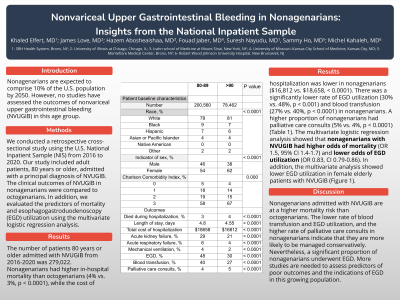Monday Poster Session
Category: GI Bleeding
P2042 - Nonvariceal Upper Gastrointestinal Bleeding in Nonagenarians: Insights from the National Inpatient Sample
Monday, October 23, 2023
10:30 AM - 4:15 PM PT
Location: Exhibit Hall

Has Audio

Khaled Elfert, MD
SBH Health System
Bronx, NY
Presenting Author(s)
Khaled Elfert, MD1, James Love, MD2, Hazem Abosheaishaa, MD, MSc3, Fouad Jaber, MD4, Suresh Nayudu, MD1, Sammy Ho, MD5, Michel Kahaleh, MD6
1SBH Health System, Bronx, NY; 2University of Illinois at Chicago, Chicago, IL; 3Hazem Abosheaishaa, Bellerose, NY; 4University of Missouri-Kansas City, Kansas City, MO; 5Montefiore Medical Center, New York, NY; 6Robert Wood Johnson University Hospital, New Brunswick, NJ
Introduction: Nonagenarians are expected to comprise 10% of the U.S. population by 2050. However, no studies have assessed the outcomes of nonvariceal upper gastrointestinal bleeding (NVUGIB) in this age group.
Methods: We conducted a retrospective cross-sectional study using the U.S. National Inpatient Sample (NIS) from 2016 to 2020. Our study included adult patients, 80 years or older, admitted with a principal diagnosis of NVUGIB. The clinical outcomes of NVUGIB in nonagenarians were compared to octogenarians using the Chi-squared test and Student's t-test. In addition, we evaluated the predictors of mortality and esophagogastroduodenoscopy (EGD) utilization using the multivariate logistic regression analysis.
Results: The number of patients 80 years or older admitted with NVUGIB from 2016-2020 was 279,022, with 78,462 patients in the nonagenarians group and 200,560 in the octogenarians group. Nonagenarians had higher in-hospital mortality than octogenarians (4% vs. 3%, p < 0.0001), while the cost of hospitalization was lower in nonagenarians ($16,812 vs. $18,658, < 0.0001). There was a significantly lower rate of EGD utilization (30% vs. 48%, p < 0.001) and blood transfusion (27% vs. 40%, p < 0.0001) in nonagenarians. A higher proportion of nonagenarians had palliative care consults (5% vs. 4%, p < 0.0001) (Table 1). The multivariate logistic regression analysis showed that nonagenarians with NVUGIB had higher odds of mortality (OR 1.5, 95% CI 1.4-1.7) and lower odds of EGD utilization (OR 0.83, CI 0.79-0.86). In addition, the multivariate analysis showed lower EGD utilization in female elderly patients with NVUGIB (Figure 1).
Discussion: Nonagenarians admitted with NVUGIB are at a higher mortality risk than octogenarians. The lower rate of blood transfusion and EGD utilization, and the higher rate of palliative care consults in nonagenarians indicate that they are more likely to be managed conservatively. Nevertheless, a significant proportion of nonagenarians underwent EGD. More studies are needed to assess predictors of poor outcomes and the indications of EGD in this growing population.

Disclosures:
Khaled Elfert, MD1, James Love, MD2, Hazem Abosheaishaa, MD, MSc3, Fouad Jaber, MD4, Suresh Nayudu, MD1, Sammy Ho, MD5, Michel Kahaleh, MD6. P2042 - Nonvariceal Upper Gastrointestinal Bleeding in Nonagenarians: Insights from the National Inpatient Sample, ACG 2023 Annual Scientific Meeting Abstracts. Vancouver, BC, Canada: American College of Gastroenterology.
1SBH Health System, Bronx, NY; 2University of Illinois at Chicago, Chicago, IL; 3Hazem Abosheaishaa, Bellerose, NY; 4University of Missouri-Kansas City, Kansas City, MO; 5Montefiore Medical Center, New York, NY; 6Robert Wood Johnson University Hospital, New Brunswick, NJ
Introduction: Nonagenarians are expected to comprise 10% of the U.S. population by 2050. However, no studies have assessed the outcomes of nonvariceal upper gastrointestinal bleeding (NVUGIB) in this age group.
Methods: We conducted a retrospective cross-sectional study using the U.S. National Inpatient Sample (NIS) from 2016 to 2020. Our study included adult patients, 80 years or older, admitted with a principal diagnosis of NVUGIB. The clinical outcomes of NVUGIB in nonagenarians were compared to octogenarians using the Chi-squared test and Student's t-test. In addition, we evaluated the predictors of mortality and esophagogastroduodenoscopy (EGD) utilization using the multivariate logistic regression analysis.
Results: The number of patients 80 years or older admitted with NVUGIB from 2016-2020 was 279,022, with 78,462 patients in the nonagenarians group and 200,560 in the octogenarians group. Nonagenarians had higher in-hospital mortality than octogenarians (4% vs. 3%, p < 0.0001), while the cost of hospitalization was lower in nonagenarians ($16,812 vs. $18,658, < 0.0001). There was a significantly lower rate of EGD utilization (30% vs. 48%, p < 0.001) and blood transfusion (27% vs. 40%, p < 0.0001) in nonagenarians. A higher proportion of nonagenarians had palliative care consults (5% vs. 4%, p < 0.0001) (Table 1). The multivariate logistic regression analysis showed that nonagenarians with NVUGIB had higher odds of mortality (OR 1.5, 95% CI 1.4-1.7) and lower odds of EGD utilization (OR 0.83, CI 0.79-0.86). In addition, the multivariate analysis showed lower EGD utilization in female elderly patients with NVUGIB (Figure 1).
Discussion: Nonagenarians admitted with NVUGIB are at a higher mortality risk than octogenarians. The lower rate of blood transfusion and EGD utilization, and the higher rate of palliative care consults in nonagenarians indicate that they are more likely to be managed conservatively. Nevertheless, a significant proportion of nonagenarians underwent EGD. More studies are needed to assess predictors of poor outcomes and the indications of EGD in this growing population.

Figure: Forest plot for multivariate logistic regression analysis for predictors of mortality (A) and EGD utilization (B).
Disclosures:
Khaled Elfert indicated no relevant financial relationships.
James Love indicated no relevant financial relationships.
Hazem Abosheaishaa indicated no relevant financial relationships.
Fouad Jaber indicated no relevant financial relationships.
Suresh Nayudu indicated no relevant financial relationships.
Sammy Ho indicated no relevant financial relationships.
Michel Kahaleh: ABBvie – Consultant. Apollo Endosurgery – Grant/Research Support. Boston Scientific – Consultant. Boston Scientific – Grant/Research Support. Cook Endoscopy – Grant/Research Support. Fujinon – Grant/Research Support. MI Tech – Grant/Research Support. Olympus – Grant/Research Support.
Khaled Elfert, MD1, James Love, MD2, Hazem Abosheaishaa, MD, MSc3, Fouad Jaber, MD4, Suresh Nayudu, MD1, Sammy Ho, MD5, Michel Kahaleh, MD6. P2042 - Nonvariceal Upper Gastrointestinal Bleeding in Nonagenarians: Insights from the National Inpatient Sample, ACG 2023 Annual Scientific Meeting Abstracts. Vancouver, BC, Canada: American College of Gastroenterology.
